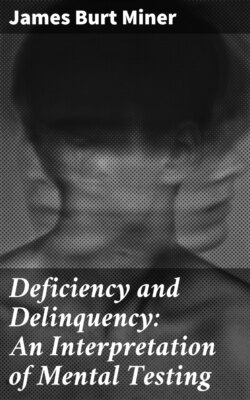Читать книгу Deficiency and Delinquency: An Interpretation of Mental Testing - James Burt Miner - Страница 20
На сайте Литреса книга снята с продажи.
C. Desirable Versus Immediately Advisable Social Care
ОглавлениеA second source of confusion arises when one investigator is thinking of the number of feeble-minded, the care of whom it is desirable that society should assume, and another is thinking of the feeble-minded, the care of whom it is advisable for society to assume at once. Considered in connection with a specific case the distinction is quite obvious. It is one thing to say that it would be desirable for the state to assume the indefinite care of a particular person, it is quite another thing to say that it would be advisable for the state to assume that care immediately, when one remembers the crowded condition of the institutions, the necessity of caring for the worst cases first, the possibility of the person being cared for by his own family or in a local school, the added public expense, the necessary neglect of other movements for social welfare if society assumes this expense, etc., etc.
When you magnify this problem in the mind of the estimator who is interested in the question of caring for the groups of feeble-minded, the result is that his estimates of the size of the groups are decidedly affected. For example, few would deny that the Site Commission of New York appointed to locate the colony for mental defectives, now known as the Letchworth Village, was emphasizing a program of permanent social care when it estimated the number of feeble-minded in New York. The Commission, “after taking into consideration the figures of the State and National census, and other data collected from institutions,” estimated that there were in New York state possibly 12,300 mentally defective persons (Editor's Note, 205, p. 84). This is less than 0.15% of the population and very low compared with most estimates.
The low estimates will generally be found to be influenced by considerations of public expense rather than the social unfitness of the lower group. Inasmuch as there are no sharp distinctions between different degrees of mental ability this consideration of public expense is perfectly proper. At the other extreme, however, are the eugenists who are convinced that it is desirable to isolate a large group at the lower range of ability. The member of the legislature will be concerned mainly with the question how much money will the public be willing to appropriate now for the care of these unfortunates. The eugenist will be thinking of an ideal rather far in the future towards which to work.
The diagnostician should take a conservative intermediate ground. He may leave to the court or other authorized tribunal to decide whether the public has the facilities available at present for caring for a particular weak-minded person, but he must decide whether expert scientific opinion at the present time will justify diagnosing this degree of deficiency as suitable for the special care provided for the feeble-minded. Whether it is advisable to care for the particular deficient at home, in a special local school, or in a state institution would be left to the legal authority to decide. Under present conditions, the diagnostician may possibly indicate whether the individual is deficient enough to justify social isolation, or merely to justify sending to a local elementary day school for deficients.
